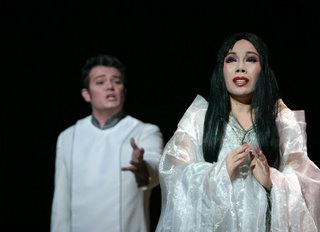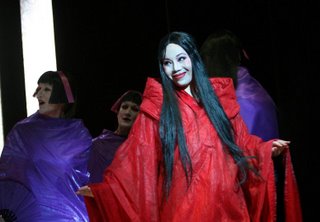 The Washington National Opera’s current run of Madama Butterfly is neither new nor original to Washington – which might be a first strike against a house that’s not a repertory company. But then Mariusz Trelinski’s staging is at least visually arresting enough to deserve being exposed to Washington opera goers a second time around since 2001. Not having seen the production then, but having been much impressed by his André Chernier last season, I looked forward to this Butterfly, even if it isn’t my favorite Puccini opera.
The Washington National Opera’s current run of Madama Butterfly is neither new nor original to Washington – which might be a first strike against a house that’s not a repertory company. But then Mariusz Trelinski’s staging is at least visually arresting enough to deserve being exposed to Washington opera goers a second time around since 2001. Not having seen the production then, but having been much impressed by his André Chernier last season, I looked forward to this Butterfly, even if it isn’t my favorite Puccini opera.I reckon that if Trelinski had to do it over again, his Butterfly would look different… and better. Taking more than just a page out of Robert Wilson’s how-to-stage-an-opera playbook, his Butterfly production is two-dimensional, visually impressive, cinematic, repetitive, beautiful. He doesn’t say much about the opera that’s new or thought-provoking. I am tempted to blame the sujet and the opera – but then I would not have thought Chernier could ever offer as much as it did (the generally philosophical conservative touch of setting the French Revolution in the light of the totalitarian regimes of the 20th century; the current-event references referring to Abu Ghraib). Scrims and screens and backdrops in lush colors, set in black frames from above, beneath, and the sides, Japanese calligraphy ("Death" ever-prominent) and rather static singers were sufficient to make any given act exceptional but were not quite enough to keep the awe or even attention sustained for all three. The second act entrance from high-above of the Bonze, in front of an angry Chicago-Bull’s emblem (or was it a horned dragon?), was a little over the top. Beyond all these wonderful impressions in a questionable whole, the most positive aspect was the fact that at least this Butterfly wasn’t a throwback to the traditional, tried-and-true setting that might otherwise have been served to us, with all its faux-Asian gloss and glitter that the most frequently performed opera in North America so often has to endure.
 The orchestra under Placido Domingo sounded full, played the score professionally, and avoided excessive brass glitches. The elements of the score that come perilously close to Italo-pop (or La Bohème) sounded best, the parts that remind more of the 20th century (or Turandot), less convincing. Surprising, for a ‘singer’s conductor’ like Domingo, it drowned out the principal singers (Xiu Wei Sun’s fragile Cio-Cio San especially) on occasion.
The orchestra under Placido Domingo sounded full, played the score professionally, and avoided excessive brass glitches. The elements of the score that come perilously close to Italo-pop (or La Bohème) sounded best, the parts that remind more of the 20th century (or Turandot), less convincing. Surprising, for a ‘singer’s conductor’ like Domingo, it drowned out the principal singers (Xiu Wei Sun’s fragile Cio-Cio San especially) on occasion. Lieutenant B.F. Pinkerton as sung by Arturo Chacón-Cruz had wonderful top notes and offered stability and pleasant tones all night. He looked the part more than many tenors I could think of – and never sounded strained. You can’t ask for much more from a tenor. Above mentioned Xiu Wei Sun also looked the part of a Butterfly, which is even more astonishing. Butterflies may not have to wear ‘small black dresses’ – but a fragile 15 year old concubine played by a middle-aged and oversized soprano would beckon more suspension of disbelieve than the story inspires in the listener. Her voice fit the part, too: agile, small, lithe, and plain. Not terribly seductive but perhaps suggestive of the submissiveness that attracted Lieutenant Pinkerton to her in the first place.
Philip Kennicott, A 'Madama Butterfly' With Pipes, if Not Legs (Washington Post, November 6) Tim Smith, A changed and lovely 'Butterfly' emerges (Baltimore Sun, November 6) WNO's 'Butterfly' soars (Washington Times, November 6) Charles T. Downey, Madama Butterfly @ Washington National Opera (DCist, November 7) |
This cast will appear again on November 15th and 17th. On November 13th, 16th, and 19th, Tatjana Borodina will be Cio-Cio San - Carlo Ventre, Pinkerton - Margaret Thompson, Suzuki - Scott Hendricks, Sharpless - Trevor Scheunemann, Yamadori and the local character tenor Robert Baker will be Goro on November the 15th, 17th, and 19th.